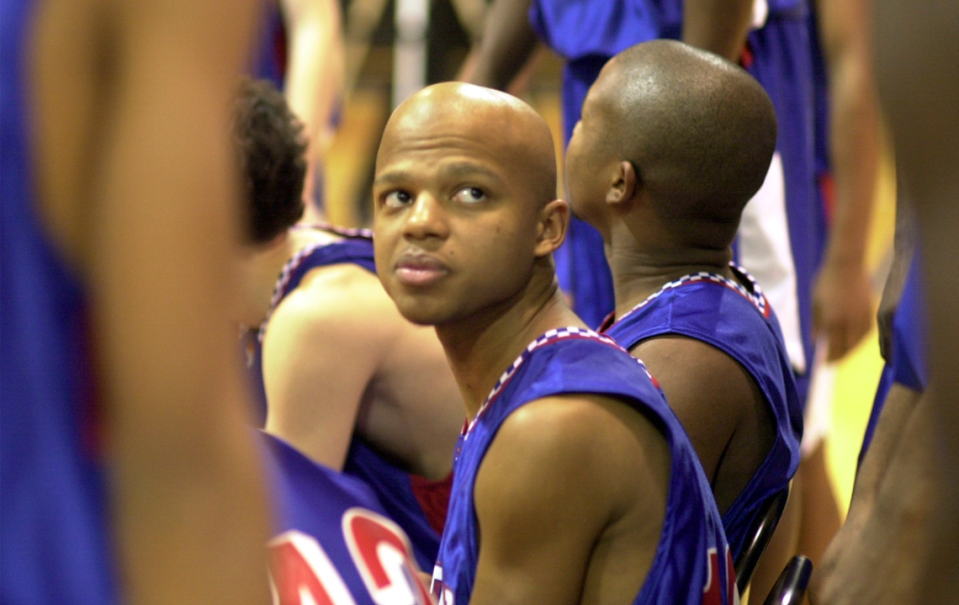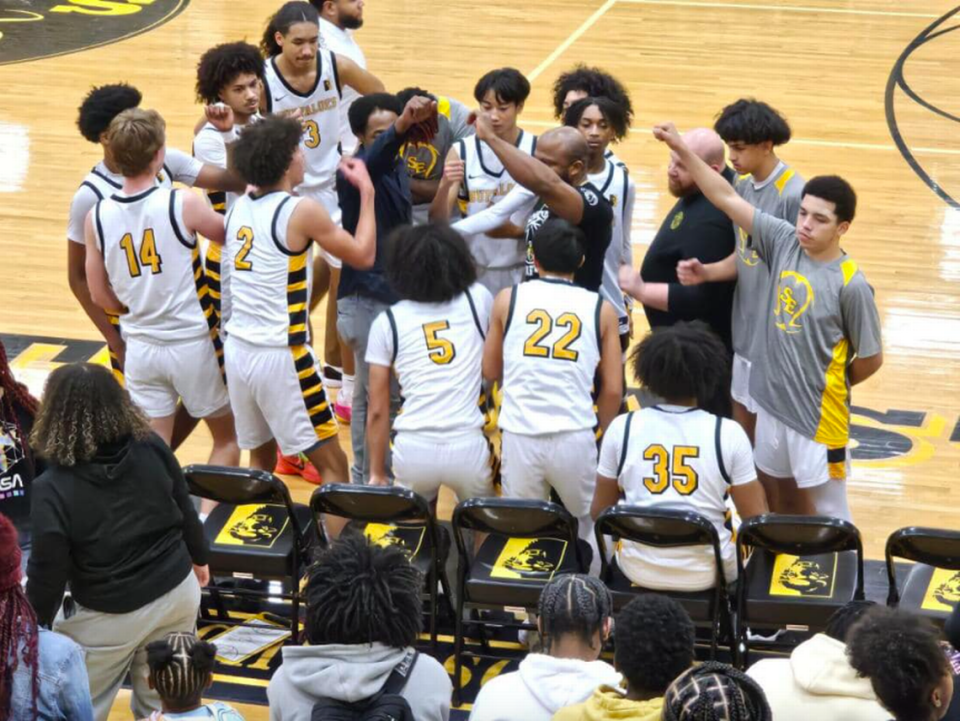‘More than just a coach’: Karl Brown uses cancer scare to inspire Southeast with love
- Oops!Something went wrong.Please try again later.
It’s an empty feeling when a season comes to an end for Wichita Southeast boys basketball coach Karl Brown.
For five months of the year, he pours everything he has into his players. He celebrates their triumphs, encourages them through their struggles and makes sure he is there for them with love and support every step of the way. In all honesty, the 39-year-old is more of a father figure than just a basketball coach to his players.
It’s easy to feel like wins and losses in sports are the measuring stick of success, so when a season falls short of its desired goal, like it did for the Golden Buffaloes on Wednesday, it’s natural to feel disappointment.
But Brown, more than anything, is an expert in resilience. There are lessons to be learned in losses, he reminds his players, and the most important victories to be gained in life don’t come on the basketball court.
It’s a perspective Brown has had after winning the battle against cancer more than two decades ago.
“When I feel like I have nothing left, I remember those days when I really had nothing left,” said Brown, who was diagnosed with non-Hodgkin lymphoma as a 18-year-old high school senior. “Ever since then, no matter what, I know I’m never going to give up because that diagnosis made me who I am today.”
Here’s how Brown became more than just a coach at Southeast.

‘Life isn’t promised’: Karl Brown gains new worldview after cancer scare
When Brown went in for his routine physical before his senior year of basketball at Wichita South, doctors informed him the lump in his stomach he thought was a pulled muscle was actually a tumor.
His parents cried when the doctor said cancer. Brown didn’t compute the seriousness of the situation until he was told he would not be able to play basketball. Cancer was such a foreign concept to a high schooler.
So he became resolute in his mission to play basketball again. He loved the game and the friends he made along the way playing it, which made for a goal that was a welcomed distraction for a teenager undergoing six months of chemotherapy.
His friends would take turns visiting him in the hospital and spending the night at his house when he was released. Brown said their company would make him forget he even had cancer at times. Ene Akpan, now the East football coach, was one of Brown’s best friends during their high school years together at South and still can’t believe the strength Brown showed.
“That’s one of my best friends and to see what he went through up close and personal, man, he was an inspiration for myself and he should be an inspiration for anyone,” Akpan said. “His back was against the wall and he had to battle back and he came through and won.”
When the 2001-02 City League season tipped off, with the permission of his oncologist, there was Brown, shaved head and rail thin, ready to play basketball for the Titans.
The memory still gives Chris Davis, who coached South that season, goosebumps.
“You talk about an absolute warrior and someone who should be a great inspiration for everyone,” Davis said. “My heart beats through my chest for that guy. I’m so proud of him.”
It was a feat for Brown just to play that season of high school basketball, but Brown’s story was far from over. He tried to run track in college, but his immune system was weakened by the cancer treatments. He had monthly visits to the doctor’s office to monitor his white blood cell count for a decade after his diagnosis.
During that span, working out had always made Brown feel better. When his doctor visits began to scale back, he found himself spending more and more time in the gym. After the cancer had made him frail for so long, Brown enjoyed the satisfaction of seeing hard work pay off to grow his body.
He soon became hooked to lifting weights and became a professional bodybuilder, which he found filled the competitive void in his life since giving up sports. He earned his pro card from World Beauty Fitness & Fashion in 2011 and started competing across the nation in shows before retiring in 2017.
“It really is a you-vs.-you sport and I love the self-discipline it brought me,” Brown said. “Every day was about eating the right things, getting to the gym, doing the right things and sticking with that routine. No one is holding you accountable other than yourself. I’ve always been a person who believes what you do in the dark will always show up in the light.”
While Brown no longer actively competes in bodybuilding shows, he still has the physique of one. He says he still works out five days a week and gets a kick out of walking into opposing gyms during basketball season.
“I guess I’m not your average-looking high school basketball coach,” Brown said with a laugh.
Brown said he feels fully healthy and only has to go to the doctors for his annual checkup these days.
But surviving cancer has forever altered his worldview.
“Sometimes when I have little aches or pains that come out of nowhere, it’s still in the back of my mind and it still kind of scares me sometimes,” Brown said. “I’ve always carried that ‘it-could-be-my-last-day’ mindset. It’s made me try to be more thoughtful than probably the average person who hasn’t faced a death scare. We never know when it’s going to be our last day. Life isn’t promised. So I try to never take anything for granted.”

‘Deeper than just a coach’: Brown coaches Southeast with love
He didn’t even realize it at the time, but a critical role model for Brown was Ben Mitchell, a teacher at Jardine Middle School when Brown was in the seventh grade.
Brown and his friends immediately took a liking to Mitchell, which translated to the pack of middle-schoolers harassing Mitchell about everything from his age to the clothes he wore.
“These little middle-school kids are trying to roast me, but I had a quick wit,” Mitchell said. “One day Karl said something really slick to me and then I came back at him and said, ‘Hey, I didn’t realize you had your own new brand.’ He was like, ‘What are you talking about?’ I told him, ‘You’re wearing Olo’ because he had a hole in his polo shirt.
“I think ever since then, we’ve had a friendship. Kids saw a taller, older Black guy, I had to be one of the only ones in the building then, and they saw an older version of themselves.”
Mitchell earned respect with his quick comebacks, but made a difference in lives with his love and support for the children. Brown never forgot the power of that and when he returned to work in the Wichita Public School district as an assistant coach at Southeast, it just so happened that Mitchell was the principal in the building.
The tutelage continued after more than two decades and when the head coaching position at Southeast came open before last season, Mitchell believed Brown’s outlook made him ready for the role despite his lack of experience.
“Discipline is the greatest form of love and that’s what he taught me,” Brown said. “He did that for me when I was in middle school and through my adult life and it had such a huge effect on me. He mentored me to always love on kids no matter what, through the good and through the bad and that’s pretty much been my motto ever since I took over.”
It’s often said in the sports world that players don’t care what a coach has to say until they know how much a coach cares. The only thing that exceeds Brown’s passion for coaching basketball is his passion for his players.
In two short years, Brown has already carved out a reputation with his players for being available whenever and wherever they need him. He has driven across town to pick up players for practice. He has paid out of pocket to create team-bonding activities, such as a night out of bowling. If a player is short on money, he makes sure they have food at lunch.
“And that’s just surface-level stuff,” Southeast guard Preston Dinh said. “He always has our backs. He believes in us and he’s always looking out for us. His relationship with us is deeper than just a coach. He teaches us more than just basketball stuff, like how to be a man in the world. He’s kind of like a father figure to us.”
Much like Jerome Tang has found success at Kansas State, Brown and his staff of Caylin Loggins, Stacy Bias and Jason Boarman motivate with love instead of fear. In moments of adversity, they try to build up with positivity instead of tear down with negativity.
Trust has been the foundation of the culture Brown has cultivated at Southeast, which has empowered his players when they are on the court.
No better example came than earlier this season when Brown opted not to call a timeout in the final seconds of a tied game with Heights. The coach placed his trust in his players and they rewarded him when Dinh raced down the floor, drew a foul and made the game-winning free throw to knock off the No. 1-ranked team in Class 6A.
“That showed us that he really does trust in us and believe in us,” Southeast star D.J. Brown said. “He gives us freedom, but he also makes sure he gives us that constructive criticism too.”
Southeast’s season didn’t end in the state tournament like Brown envisioned or hoped, but Mitchell, now the principal at Gateway Alternative Program, believes the Southeast players gained much more than an experience at Koch Arena from being coached by Brown.
“Southeast has some kids with inconsistencies and insecurities in their life,” Mitchell said. “What they’re going to get from (Brown) is a consistent and persistent relationship through the ups and the downs.”
Brown knows the disappointment from an early ending will eventually subside, replaced by the excitement next season brings with almost every key player slated to return to Southeast.
After overcoming real adversity in life, Brown is a testament to his players on the power of resilience.
“That’s why through the ups and the downs, I always tell my players that I love them every day,” Brown said. “And I trust in them and I believe in them. That’s the kind of culture we’re trying to build around here.”

